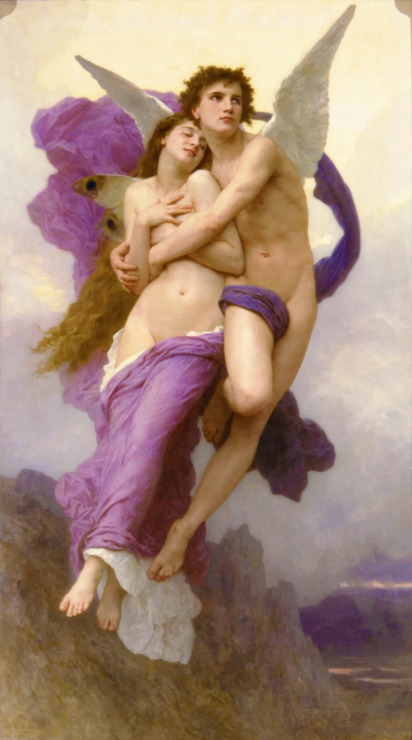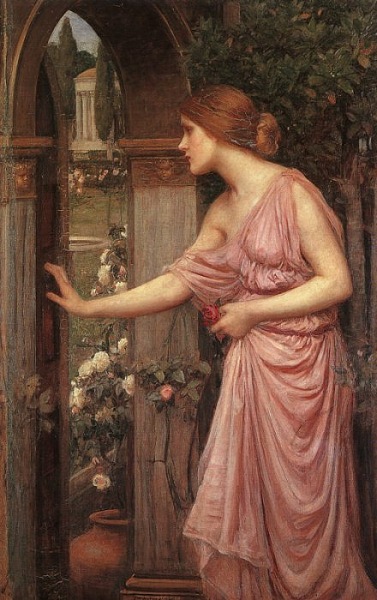Ode to Psyche
O Gooddess! hear these tunealess numbers, wrung
By sweet enforcement and remembrance dear,
And pardon that thy secrets should be sung
Even into thine own soft-conchèd ear:
Surely I dream’d to-day, or did I see
The wingèd Psyche with awaken’d eyes?
I wander’d in a forest thoughtlessly,
And, on the sudden, fainting with surprise,
Saw two fair creatures, couchèd side by side
In deepest grass, beneath the whisp’ring roof
Of leaves and trembled blossoms, where there ran
A brooklet, scarce espied:
‘Mid hush’d, cool-rooted flowers, fragrant-eyed,
Blue, silver-white, and budded Tyrian
They lay calm-breathing on the bedded grass;
Their arms embracèd, and their pinions too;
Their lips touch’d not, but had not bade adieu,
As if disjoinèd by soft-handed slumber,
And ready still past kisses to outnumber
At tender eye-dawn of aurorean love:
The wingèd boy I knew;
But who wast thou, O happy, happy dove?
His Psyche true!
O latest-born and loveliest vision far
Of all Olympus’ faded hierarchy!
Fairer than Phoebe’s sapphire-region’d star,
Or Vesper, amorous glow-worm of the sky;
Fairer than these, though temple thou hast none,
Nor altar heap’d with flowers;
Nor Virgin-choir to make delicious moan
Upon the midnight hours;
No voice, no lute, no pipe, no incense sweet
From chain-swung censer teeming;
No shrine, no grove, no oracle, no heat
Of pale-mouth’d prophet dreaming.
O brightest! though too late for antique vows,
Too, too late for the fond believing lyre,
When holy were the haunted forest boughs,
Holy the air, the water, and the fire;
Yet even in these days so far retired
From happy pieties, thy lucent fans,
Fluttering among the faint Olympians,
I see, and sing, by my own eyes inspired.
So let me be thy choir, and make a moan
Upon the midnight hours;
Thy voice, thy lute, thy pipe, thy incense sweet
From swingèd censer teeming:
Thy shrine, thy grove, thy oracle, thy heat
Of pale-mouth’d prophet dreaming.
Yes, I will be thy priest, and build a fane
In some untrodden region of my mind,
Where branchèd thoughts, new grown with pleasant pain,
Instead of pines shall murmur in the wind:
Far, far around shall those dark-cluster’d trees
Fledge the wild-ridgèd mountains steep by steep;
And there by zephyrs, streams, and birds, and bees,
The moss-lain Dryads shall be lull’d to sleep;
And in the midst of this wide quietness
A rosy sanctuary will I dress
With the wreath’d trellis of a working brain,
With buds, and bells, and stars without a name,
With all the gardener Fancy e’er could feign,
Who breeding flowers, will never breed the same;
And there shall be for thee all soft delight
That shadowy thought can win,
A bright torch, and a casement ope at night,
To let the warm Love in!
-John Keats
Enjoy Artistic Representations of “Ode to Psyche” by John Keats

The abduction of Psyche by William-Adolphe Bouguereau, 1895.

Psyche Entering Cupid’s Garden by John William Waterhouse, 1903.
Listen to Readings of “Ode to Psyche”
Listen to this Musical Interpretation of “Ode to Psyche” by John Keats
John Keats Biography
Keats was born in London on Oct. 31, 1795; a few weeks later he was baptized at St. Botolph Without Bishopsgate Church, near where his parents lived and father worked as the manager of a stable owned by his father-in-law. Keats was the eldest of four children, with George, Tom, and Fanny following him. The family was well off enough that the boys were sent to Clark’s Academy in Edmonton at what is now the north London borough of Enfield for their education; it was riding his horse home from a visit to the school that Keats’ father fell and died the next day. His mother remarried (rather quickly, in fact), fought with the rest of the family, and died fairly young from consumption or tuberculosis, which was all too common at the time and would eventually claim the life of Keats’ youngest brother, Tom, as well as Keats himself.
He was apprenticed to a local doctor, but the relationship didn’t seem to work too well. He ended up working at St. Guy’s Hospital in the Southwark district of London, continuing his medical training and writing poetry (the site of the original St. Guy’s in now occupied by London’s tallest office building, known locally as “The Shard”).
While Keats had numerous city connections (Anita Miller also has a “Keats in the City” walk), it is with Hampstead that he is most closely associated. Fellow poets lived there, as did the editor who first published his poetry. Artists whom Keats associated with lived there. Keats himself would move there with his brothers. Keats and his friends would wander Hampstead Heath, talking and arguing poetry and the issues of the day. After moving into Wentworth House in Hampstead, Keats wrote five of six famous odes, including “Ode to a Nightingale.” And it would be at Wentworth House in Hampstead that Keats would realize that he was dying from the same disease that took his mother and younger brother.
Enjoyed Ode to Psyche by John Keats and want to know more about Keats’ life? Try A Month With Keats: A Walk Into His Life
That’s it for Ode to Psyche!
BUY ‘HOW TO WRITE A FORM POEM’ NOW!
